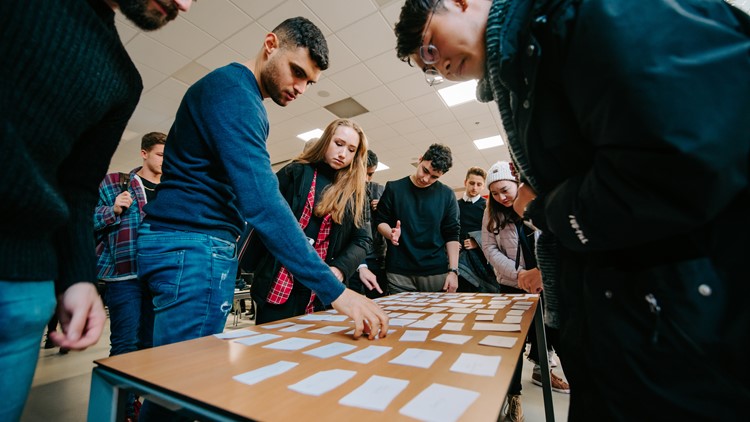Facts and figures
The programme at a glancePart of School
Programme information
What to expectAbout the programme
Within the IBaC programme, you will develop and (partially) implement a business strategy to a real-life business challenge in the field of circular, digital or purpose economy:
- in an international multicultural context;
- with a strong focus on marketing and innovation;
- meeting the needs and wants of the customer;
- thereby achieving impactful results;
- that are logistically feasible and legally and financially sound.
Innovative teaching approaches ensure a dynamic, stimulating environment, in which students are triggered to find strategic, creative solutions for real international business challenges, to develop critical competences and to achieve the very best. The competitive atmosphere encourages them to strive for optimal results, allowing them to stand out, to develop their personal and professional leadership skills and to gain a head-start when applying for a job.
Build up your network!
In the IBaC programme, we host students from all over the world and from different disciplines, because we are working with 80 different partner universities. In a globalised business world, the importance of a well-maintained network cannot be over-emphasised. The contacts you will make during the semester, will broaden your international network and will help you with your future career.
Method
In a challenging real-life project, divided in three periods, student groups will form independent consultancy teams and will work as a multicultural and multidisciplinary team. The main purpose of this consultancy is to provide a company or non-profit organisation which is challenged with an international business problem, with strategically balanced and sustainable advice on how to approach this.
In some cases, the teams will be even multinational, collaborating with students from partner institutions across the globe, working in different time zones.
Companies or NGOs selected as project partner will expect a level of professionalism and will demand realistic solutions to their challenge. In most cases, digital transitions, circularity and impactful entre- or intrapreneurship will play a central part in the challenge given to the student teams.
Steps to Be Taken:
- Discover: Research and Analysis
Analysing the problem. - Define: Formulating the strategy
Formulating the business strategy on how to tackle the problem. - Develop: Market strategy and Marketing approach
Creating a concise, but concrete strategic marketing and implementation plan, including a financial statement. - Deliver: Implementation
Implementing (partially) the strategy and analysing the first implementation results. - Deliver: Recommendations to the organisation
Presenting an improved business strategy with a concrete operational plan to the organisation.
Course selection
The full study load is 30 ECTS, divided as follows:
A. Project (18 ECTS)
Real-life business project, including market research and innovation and consisting of 3 courses:
- Defining the Challenge (6 ECTS)
- Formulating the Strategy (6 ECTS)
- Implementation and Advice (6 ECTS)
B. Support Unit (6 ECTS)
- European Business (2 ECTS)
- Geopolitics (2 ECTS)
- The Supply Chain and E-business (2 ECTS)
C. Leadership Course (6 ECTS)
For further questions, please send an email to HRBS-international@hr.nl
Type of assessment
There will be different forms of assessments:
- Presentations
- Reports
- Oral assessments
- Exams
For more detailed information, see the specific courses (section Subjects on this page).
Field trip
One of the highlights of the IBaC programme is the field trip, as part of the research for the project. This optional field trip will be organised in two varieties: one at a European destination and one in the Netherlands. More details will be provided before the start of the programme.
Learning outcomes
If you have successfully completed this exchange programme then you are able to:
- Research and analyse a real-life international business challenge in a new-economy context;
- demonstrate an understanding of research design and data collection methods including motivated choices for an approach;
- apply the principles of design thinking to find solutions for user based challenges,
- apply marketing/business concepts in an international, complex and challenging environment;
- respond in a creative, flexible and innovative way to current international business challenges;
- translate these problems into sustainable, future-proof, profitable and impactful solutions;
- implement them, test them and improve them;
- communicate with stakeholders in a professional manner;
- satisfy the needs and wants of a client;
- work in a multicultural and multidisciplinary team in an international context and know how to reflect on it.
And furthermore:
- Formulate a vision and show insight on how to develop futureproof responsible leadership;
- show responsibility for your own futureproof career;
- ask and process feedback regarding your own personal goals;
- focus on and differentiate within the needs of others within a multi-cultural context;
- handle uncertainty, unclarity and risks and act upon them.
And will have:
- A thorough understanding of the European and global context in which international businesses operate;
- thorough practical knowledge of the supply chain and e-commerce.
Calendar
|
Planning Fall 2025-2026 |
|
|
Period 1 Sept 1-Oct 10 |
|
|
Sept 1-5 |
Kick-off Days |
|
Sept 15-19 |
Research Week |
|
Oct 6-10 |
Exam Week 1 |
|
Fall Break Oct 20-24 |
|
|
Period 2 Oct 27-Nov 28 |
|
|
Oct 27-31 |
Field Research Week |
|
Nov 10-14 |
Sprint Week |
|
Nov 24-28 |
Exam Week 2 |
|
Period 3 Dec 1-Jan 23 |
|
|
Christmas Break Dec 22-Jan 2 |
|
|
Jan 12-23 |
Exam Week 3 + Resits |
|
Jan 22 |
Outro event |
Outside of the mentioned weeks, regular classes take place.
Awarding
After successfully completing your exchange programme at Rotterdam University of Applied Sciences, you will receive a:
- Transcript of Records
- Special IBaC Certificate
Besides this, the best team will win the IBaC challenge cup.
Subjects
An indication of the subjects you can expect
Block 1
-
Project Phase 1 - Defining the Challenge (6 ECTS)
Project Phase 1 - Defining the Challenge (6 ECTS)
Topics
- Exploring, understanding and formulating the business challenge.
- General and more specific research techniques and their application to the business challenge.
- Formulating concrete research questions and testable hypotheses,
- Designing and writing a research proposal.
- Determining what research methods to use when and for what type of research questions.
- Designing, conducting and analysing desk research.
- Designing, conducting, and analysing interviews as a qualitative research method.
- Designing, conducting, and analysing questionnaires as a quantitative research method.
- Demonstrating that the research design and data collection methods you are using are valid and reliable.
Learning materials
To be announced.
Learning outcomes
If you have successfully completed this course, then you are able to:
- Research and analyse a real-life business challenge in an international context;
- demonstrate an understanding of research design and data collection methods including motivated choices for an approach.
Type of assessment
Research report and presentation
Module code
RBSIBAC01
-
Support Unit 1 - European Business (2 ECTS)
Support Unit 1 - European Business (2 ECTS)
Topics
The European Union is one of the world’s largest and most important economies and markets. This course will provide an insight into the European Business Legal Framework, facilitating Business in Europe, through its cultural and political dimension.
The following topics will be discussed:
- Different forms of capitalisms influencing the conduct of business in Europe.
- European Union basics (European institutions and principles).
- European legislation: the EU four Free Movements and EU Competition Law.
- Current affairs: Brexit and any relevant affairs affecting the course of business in Europe and the world.
Learning materials
Extracts from books and academic journals provided in class.
N.B. One or two half-day/one-day field trips will be part of this course.Learning outcomes
If you have successfully completed this course, then you are able to:
- Solve cases related to current affairs and European Legislation;
- apply the theories learnt in class to a given case;
- perform the appropriate analysis using the tools learnt in.
Type of assessment
Oral presentation and report
Module code
RBSIBAC04
-
Leadership Course (6 ECTS)
Leadership Course (6 ECTS)
Topics
Not everyone can be a leader, but everyone can show leadership. This course will focus on developing and applying leadership skills in a professional, multi-cultural context.
You will engage with others in a multi-cultural setting and you will be challenged to seek your professional boundaries. Through the development of futureproof responsible leadership, you will empower yourself as well as others and aim for new levels. You take responsibility for your own career and will be given the opportunity to explore new options.
This course will run over the complete semester and alongside the other courses.
Learning materials
To be announced.
Learning outcomes
If you have successfully completed this course, then you are able to:
- Formulate a vision and show insight on how to develop futureproof responsible leadership;
- show responsibility for your own futureproof career;
- ask and process feedback regarding your own personal goals;
- focus on and differentiate within the needs of others within a multi-cultural context;
- handle uncertainty, unclarity and risks and act upon them.
Type of assessment
Final Evaluation talk, based on a portfolio that you will build up during the semester.
Module code
RBSIBAC07
NOTE: Course takes place in block 1, 2 and 3. Total number of ECTS: 6.
Block 2
-
Project Phase 2 - Formulating the Strategy (6 ECTS)
Project Phase 2 - Formulating the Strategy (6 ECTS)
Topics
During Project Phase 2, student consulting teams will experience a GV Design Sprint to help them ideate and test prototypes, in order to find a solution to the business challenge. By applying design thinking principles and performing a sprint, teams will be able to rapidly test their hypothesis or their preferred solution amongst users. Using build measure learn principles, students will gain valuable insights for their international business project. The innovation support provides students with the following skills they will apply in the project:
- Understand the need for multiple iterations in finding solutions;
- understanding the benefits and shortcomings of a SPRINT;
- understand benefits and shortcomings of various ideation techniques;
- build and test a relevant prototype;
- account for choices and are able to reflect on the impact of these choices;
- translate the results of prototype testing to relevant insights for client;
- present findings and results of prototype testing to client.
Learning materials
To be announced.
Learning outcomes
If you have successfully completed this course, then you are able to:
- Apply the principles of design thinking to find solutions for user based challenges;
- apply marketing/business concepts in an international and complex environment;
- respond in a creative, flexible and innovative way to current international business challenges;
- identify possible collaboration challenges in multicultural and multidisciplinary teams and formulate an adequate approach to affront them;
- communicate with stakeholders in a professional manner.
Type of assessment
Report, presentation and oral team assessment
Module code
RBSIBAC02
NOTE: In this phase, students will have the opportunity to do field research in the Netherlands or at another European destination. This will be done in the form of a field trip, guided by a lecturer.
-
Leadership Course (0 ECTS)
Leadership Course (0 ECTS)
Topics
Not everyone can be a leader, but everyone can show leadership. This course will focus on developing and applying leadership skills in a professional, multi-cultural context.
You will engage with others in a multi-cultural setting and you will be challenged to seek your professional boundaries. Through the development of futureproof responsible leadership, you will empower yourself as well as others and aim for new levels. You take responsibility for your own career and will be given the opportunity to explore new options.
This course will run over the complete semester and alongside the other courses.
Learning materials
To be announced.
Learning outcomes
If you have successfully completed this course, then you are able to:
- Formulate a vision and show insight on how to develop futureproof responsible leadership;
- show responsibility for your own futureproof career;
- ask and process feedback regarding your own personal goals;
- focus on and differentiate within the needs of others within a multi-cultural context;
- handle uncertainty, unclarity and risks and act upon them.
Type of assessment
Final Evaluation talk, based on a portfolio that you will build up during the semester.
Module code
RBSIBAC07
NOTE: Course takes place in block 1, 2 and 3. Total number of ECTS: 6.
-
Support Unit 2 - Geopolitics (2 ECTS)
Support Unit 2 - Geopolitics (2 ECTS)
Topics
In this supporting course, we will dive into the world of the current global challenges in the geopolitical arena. We will compare and analyse different perspectives towards these challenges and their implications on organisations and consumers.
Learning materials
To be announced.
Learning outcomes
If you have successfully completed this course, then you are able to:
- Understand current geopolitical challenges;
- understand their impact on organisations and consumers;
- compare and understand different perspectives.
Type of assessment
Report and presentation
Module code
RBSIBAC05
Block 3
-
Project Phase 3 – Implementation and Advice (6 ECTS)
Project Phase 3 – Implementation and Advice (6 ECTS)
Topics
During Project Phase 3, student consulting teams will undergo multiple iterations to validate their recommendations before presenting the final report to their client.
Topics that will be discussed are:
- Implementation Plan and recommendation to organisation
- Implementation with Marketing Operations and Financial Statement
- Recommendations for client including short term action plans
- Impact of marketing and sales plan on client’s BMC
Supported by:
- Validation of hypothesis based on prototype and user testing
- Recommendations by field experts
Learning materials
To be announced.
Learning outcomes
If you have successfully completed this course, then you will be able to:
- Apply marketing/business concepts in an international, complex and challenging environment;
- respond in a creative, flexible and innovative way to current international business challenges;
- translate these problems into sustainable, future-proof, profitable and impactful solutions;
- implement, test and improve these solutions;
- communicate with stakeholders in a professional manner,
- satisfy the needs and wants of a client,
- work in a multicultural and multidisciplinary team in an international context and know how to reflect on it.
Type of assessment
Fully completed written report including recommendations for and presentation to the client
Module code
RBSIBAC03
-
Support Unit 3 – The Supply Chain and E-commerce (2 ECTS)
Support Unit 3 – The Supply Chain and E-commerce (2 ECTS)
Topics
Rotterdam is the main port of Europe and gateway to the hinterland. Therefore this course cannot be missed in our IBaC programme. This course will introduce students into the principle of the supply chain and e-commerce. It will enable students to reflect upon new technologies and international developments related to these topics, in order to be able to advise a client in setting up cross-border supply chains.
A visit to one of the most innovative ports in the world, will be part of this course. A must-see on your bucket-list.
Learning materials
To be announced.
Learning outcomes
If you have successfully completed this course, then you will be able:
- To picture how changing transport costs and transit times influence the flow of goods and the organisation of global supply chains;
- to understand the importance of building a dashboard for your company to measure impact.
Type of assessment
To be announced.
Module code
RBSIBAC06
-
Leadership Course (0 ECTS)
Leadership Course (0 ECTS)
Topics
Not everyone can be a leader, but everyone can show leadership. This course will focus on developing and applying leadership skills in a professional, multi-cultural context.
You will engage with others in a multi-cultural setting and you will be challenged to seek your professional boundaries. Through the development of futureproof responsible leadership, you will empower yourself as well as others and aim for new levels. You take responsibility for your own career and will be given the opportunity to explore new options.
This course will run over the complete semester and alongside the other courses.
Learning materials
To be announced.
Learning outcomes
If you have successfully completed this course, then you are able to:
- Formulate a vision and show insight on how to develop futureproof responsible leadership;
- show responsibility for your own futureproof career;
- ask and process feedback regarding your own personal goals;
- focus on and differentiate within the needs of others within a multi-cultural context;
- handle uncertainty, unclarity and risks and act upon them.
Type of assessment
Final Evaluation talk, based on a portfolio that you will build up during the semester.
Module code
RBSIBAC07
NOTE: Course takes place in block 1, 2 and 3. Total number of ECTS: 6.
Practical matters
What you need to knowLocation Kralingse Zoom
Where you can find us





